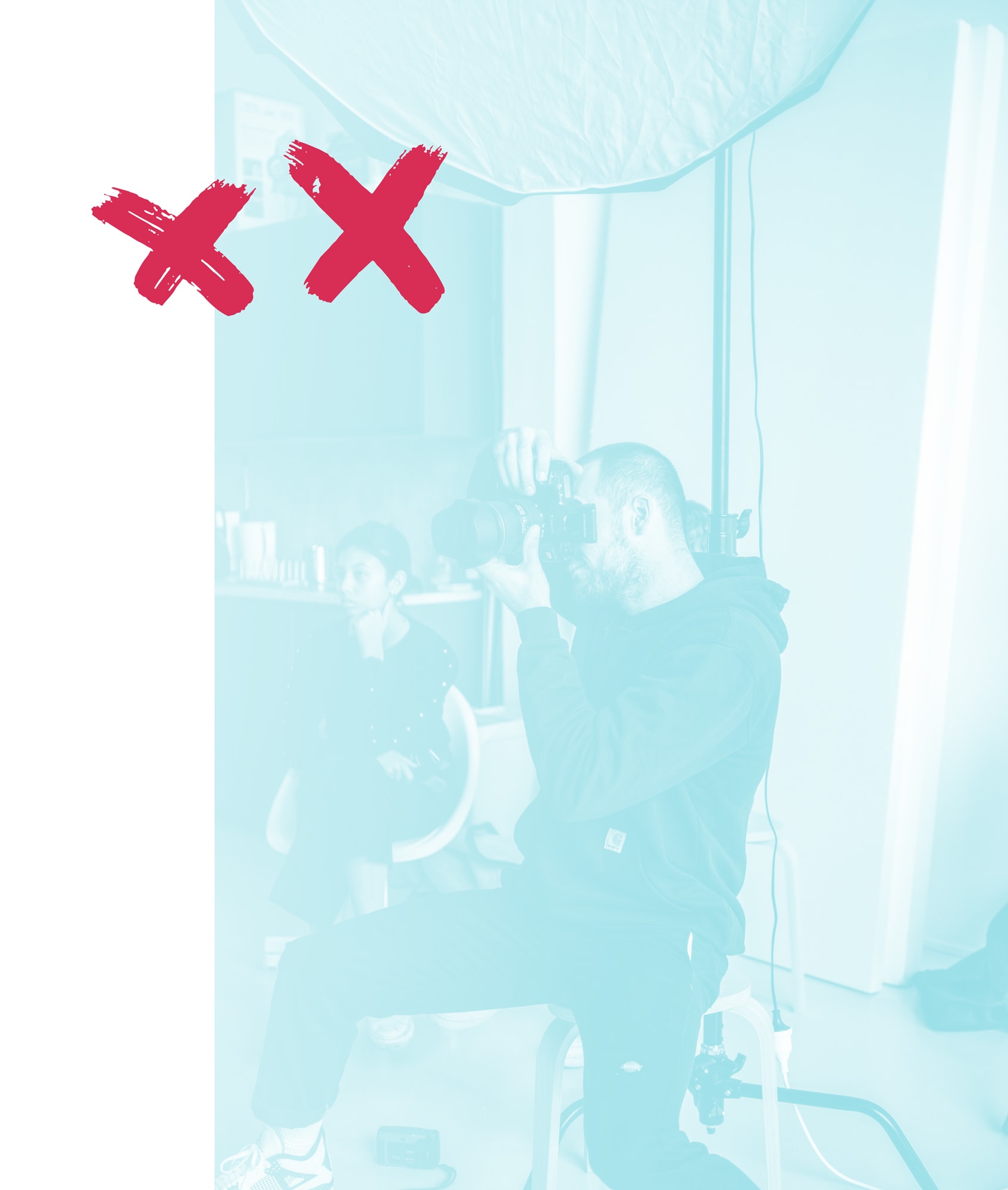The Dark Side of Online Business:
A Call for the Status Quo to Dramatically Change
By Maggie Patterson
All opinions in this post and the accompanying podcast are my opinions and mine alone. You can view our full disclaimer here.
Since then, my journey has had a lot of twists and turns, but what I’ve learned along the way is that the online business industry is seriously messed up. And please, make no mistake, it is just that. It’s an entire industry whose mission is to teach you how to run and grow your business using the internet.
Listen Now to this essay on the BS-Free Service Business show
Why Hasn’t the Dark Underbelly of Online Business Been Exposed?
While in theory the idea of building an online business sounds awesome, there’s a dark underbelly that many of us know is there, but it’s not talked about nearly enough.
It needs to be carefully examined and unpacked, because the amount of harm being done as people get sucked in is staggering. Plus, many of these practices replicate the same systemic problems of our white, capitalist, patriarchal society.
As the online business world continues to grow and new people discover it every single day by the thousands, it’s hard to understand why it’s not subject to the same level of scrutiny as other industries.
Take for example, multi-level marketing (MLM) companies. As someone who was involved with a direct sales company for years (and I was a rare success story), I’ve seen an entire body of work critiquing this industry in detail. From podcasts like The Dream and Toxic Positivity, to John Oliver’s MLM expose, there’s been a growing push to help people understand how these types of businesses can be incredibly exploitative.
Another prime example of this was Wondery’s Guru podcast, which unpacked issues in the self-help industry. As I listened to podcast, the crossover with what I see happening every day in the online business world was abundantly clear.
The fact is, this industry shares many of the same issues identified in the Guru podcast, and that are common within MLMs. From a lack of professional standards and oversight, to shady business practices, to toxic positivity, the parallels are undeniable.
Many of us know all too well how the online business world is broken, yet we don’t really talk about it. And there’s a very good reason for that.
A Conspiracy of Silence

Over my eight years in this industry, I’ve worked with hundreds of fellow online business owners. I’ve made countless friends around the world. Every single day, conversations are happening behind closed doors about unethical business practices, lies being told, and all kinds of treachery. (Much of which is pretty unimaginable to someone outside this industry.)
Some of the things I’ve seen and heard are heartbreaking, others are dark and disturbing but still very little is said in public because people are scared. People are incredibly reluctant to share anything on social media or go on the record because they’re fearful of retribution or having a big name in the industry try to take them down.
That fear is real. I know because I have struggled with it for years. While I put on a brave face speaking about these issues, I’m still very mindful of what I will say in public.
One reason is because a number of the programs I’ve paid for included non-disparagement clauses, meaning I can’t say a bad word about them. In other cases, I’m bound by NDAs with past clients and I don’t take those lightly.
And that’s just the potential legal ramifications.
Here in 2020, I’m at a point business-wise where I simply don’t want to spend another moment of my time biting my tongue about what I’m seeing and being a party to it. That’s not why I started Small Business Boss, and I’m unwilling to compromise my ethics anymore.
Truth? I can’t show up and say I’m committed to dismantling systems of oppression and being actively anti-racist, and then continue to co-sign the use of these tactics day in, day out. My silence, especially as a mentor, writer and podcaster makes me complicit.
It’s worth noting that I’m in a unique situation in that the income from Small Business Boss is a relatively small portion of my overall revenue. That gives me the luxury of being able to speak up.
I recognize that other online business owners don’t have this same freedom as I do. They’re not in a position to risk their livelihoods. Understandably, their impulse for self-preservation is extremely high.
(This isn't a pass for people to be silent, but rather a recognition of WHY this is the way it is.)
Since I started speaking out more publicly about problems with the online business world, I get direct messages on Instagram on a daily basis with people sharing their stories with me. And, when I set out to do the research for this article, I was flooded with stories from people who wanted to share their experiences.
A Note on the Stories Shared in this Post
All stories shared in this post were collected in one-to-one interviews, or via messaging on social media. The majority of these stories were shared with me on the condition of anonymity, and every reasonable effort was made to verify the identity of individuals providing stories with me. Also, each story was approved by the participating individuals to ensure factual accuracy.
Finally, in this post, I use the self–reported gender pronouns provided by participants.
However, the overwhelming majority of people don’t want to be publicly named, which is exactly how everything I’m about to share continues to happen day in, day out. All while thousands of people are scammed, ripped off and victimized in the process.
This industry, one that claims give you “freedom” often does the exact opposite.
WHY?
First, many of the practices I outline below have been around for years, and have been accepted as “business as usual”.
It’s the way we’ve been taught to run our businesses and we’ve been trained to accept these practices as the way to get ahead with an online business thanks to the circles of indoctrination which I share in a blog post here.
Plus, at a macro level, many of these practices are familiar to us as they mirror the world at large and we’re socialized to simply accept the status quo.
And that's how things across this industry continue to operate in this unhealthy, unethical way.
The Four Harmful Pillars of Online Business as Usual
I’ve written extensively about the online business ecosystem, and what I call Celebrity Entrepreneurs. These are businesses that exist to help us build our businesses with a host of tactics and strategies.
Through this work, I’ve identified four core pillars of these celebrity entrepreneur brands, and I’ve spent over 20 hours in the past two months collecting examples and stories from those within the industry. (And that’s not including all my other research or the time to write this essay.)
Pillar #1: Invented Authority

Celebrity entrepreneurs are essentially influencers of the online business world. They’re personality-driven brands that many times are built on invented authority.
These brands look good, but there’s no real expertise or mastery backing it up.
In the current climate, there’s nothing holding anyone back from declaring themselves an expert. Here in 2020, the internet is now the home of the self-proclaimed expert.
The problem being that once you put some fancy branding with some flashy photos around it, and then add in some shameless claims, it’s increasingly difficult to figure out who’s actually got experience and who’s a fraud.
A common refrain in business programs is “fake it until you make it” or “you just need to be a couple steps ahead,” which means we have countless personality-driven aspiring celeb entrepreneurs who are clueless about what they’re doing. Sure, they’ve claimed what they’re doing works, but there’s no way to verify that.
They’re building their businesses based on authority that they’ve invented out of thin air. Here’s how they do it.
Using Titles to Signal Power
When inventing authority, the personality brand is created to trap us into thinking this person is someone we can trust.
Many times it will start with sharing “credentials” they have, such as past experiences or titles. The problem being that these experiences aren’t always real. They’re carefully crafted to get us to think they’re something they’re not.
Plus, this industry loves nothing more than to create fancy titles to signal power and authority. This is why there’s an abundance of coaches and teachers that are just starting out with no experience that refer to themselves as the CEO. What they’re the CEO of aside from their fledgling business, I’m not entirely sure.
Worthless Certifications
Many times these individuals may have “certifications” to demonstrate their competence. While many certifications are valid, just as many aren’t.
Across the online business industry, certifications have become a cash cow for people who want to make more money.
There are many coaches at the top of this industry who’ve made up coaching certifications as a way to get access to people’s wallets. Unlike many other legitimate and ethical coaching certifications, these fabricated ones include little in the way of how to actually put your certification into practice as a business. Plus, when these coaches are done, they create a business to teach other people how to become coaches, essentially creating a coaching version of a MLM.
The result? Worthless certifications that sound great, but actually don’t mean anything in terms of real skills or experience.
One person I interviewed shared how when she started out as a health coach, there were so many certifications that made massive promises. She eventually enrolled in one after doing what she thought was a diligent effort of vetting it.
Overall, she found the program content was interesting and helpful, but more so on a personal level, which she found out was a common theme. Many women undergoing health, fitness and wellness certifications do so because they’re attracted to the subject matter and many times have some underlying issue such as an eating disorder, over exercising or disordered eating.
Having struggled with issues herself, she felt as though the program didn’t adequately address this safety concern.
The other thing this woman shared was that once the certification was done, there was little in the way of actual solid business advice such as how to find clients, manage a business, and so on.
However, what there was plenty of was a push to take the next certification, training, or specialties with the company and other “trusted partners”. Ultimately, this plants the seed of doubt that maybe you need to get this next specialty to set yourself apart before you start your business. She saw many of her peers continue this perpetual certification cycle for years to the tune of multiple five figures of investment.
Signalling Affluence with Images
Imagery is a huge part of the personality brand. Photos are used to not-so subtly tell us that this is someone we can trust. Depending on the brand, this is done in different ways, but clothes, accessories and even location come into play.
In Kelly Diels’ work on the Female Lifestyle Empowerment Brand (FLEB) she shares how the first rule of these brands is to be beautiful. She details how FLEBs use “beauty, heterosexuality, and glamorous photoshoots signalling hyperfemininity as part of their outreach strategy.” Diels goes on to say that they do this to assert their authority and that it reinforces the patriarchal system in which we live.
The use of imagery is a key part of inventing authority and it’s used by all of the celebrity entrepreneur archetypes.
While what I call the Fancy AF Lady Boss may use a Paris photoshoot to showcase her lifestyle, a member of the Woo Crew may have photos done at sunset in the desert. Or the BFF Next Door may use images of their “everyday” life to show that they’re just like you.
But make no mistake, those images all have the same intention. To signal affluence, showcase their success and gain our trust.
Even if none of it is real. The dress may be rented, they may have maxed out all their credit cards to travel to an exotic location, and they’re nothing like the image they portray. Doesn't matter, because we're willing to open our wallet based on this image of affluence.
Results Not Typical Social Proof
Next up, are testimonials. The social proof of testimonials are pure gold, until it’s being used as a shady way to convince you that a would-be expert is qualified.
However, testimonials are easily faked, exaggerated and they’re often turned against us; they're the literal best case scenario. Many times, results in testimonials aren’t at all typical.
Six years ago, I had my name and image taken, and then a testimonial attributed to my name by a coach in Australia. My friend and client Megan Van Groll, recently had a similar case where she found her image being used all over the internet. In some cases she was a “stock photo” and in other cases it was clear the testimonials were completely fake.
That’s just the start of the problems here. Testimonials often make big promises and share the results of one person that are unlikely to ever be replicated by another. They tap into our desire to succeed or be their star student, and thereby tricking us into trusting the person selling to us.
The “As Seen On” Hack
Public relations or PR, is often seen as a way to quickly gain authority, which is true to a point. As someone who used to spend my days pitching stories for clients to big-name media, I’ve seen how transformative the right media placement can be.
This is exactly why so many online “experts” use media logos to bolster their authority. But here’s something that very few people know. Many times those logos they’re using aren’t completely legitimate.
There’s a little-known hack that many “PR services” use to help their clients get logos to use on their media pages. By sending out a press release on a paid wire service, that press release will automatically run on a number of websites. We’re talking about major media like NBC and ABC.
Using those logos implies someone is a thought leader, yet many times there’s no actual thought leadership happening. In these cases, you can easily figure it out as there aren’t any media features they can point to in order to back it up.
Inflated and Creative Revenue Claims
The online business world is all about helping you make money so it’d follow that revenue is something that’s discussed often, and done so freely.
In the case that it’s done in a way that’s truthful and thoughtful, it isn’t a problem. The problem lies in the fact that income claims are frequently used as a way to signal authority and validity of the person’s brand. Having a certain “level” of business is seen as proof that they’re someone you can trust.
However, many times, income claims are inflated, exaggerated or entirely fabricated. This is done in a number of ways from reporting “cumulative” income, booked revenue that’s not yet in the bank, or “creative” math.
The flip side of these revenue claims is that there’s very little discussion around profit. Revenue is one thing, but what I really want to know is how much money you’re actually keeping. There are hundreds of business owners in this space with 7-figure businesses that are in debt up to their eyeballs and have very little take home pay.
While a business may “make” a million dollars in revenue, which looks impressive on the surface, the behind-the-scenes often isn’t something to aspire to.
Everyone’s a Freakin’ Coach
In this world, anyone can be anything they want. You could start a business tomorrow with exactly no business experience and call yourself a business coach. Add in some personality, and you’re ready to rock and roll.
In the words of my friend Stephanie Hayes who’s a business coach, “I want people to stop calling themselves business coaches. Everyone is calling themselves a business coach now, even if that’s not what they do as they think that’s where the money is. If you’re a funnel designer, call yourself that. It’s very confusing for clients as they need your specific skills, not another business coach.”
Beyond the obvious problems of getting counsel from people who literally have little to no mastery as coaches or teachers, there’s a much bigger problem that impacts all of us.
When people are inventing authority using any of the tactics outlined above it’s challenging for the rest of us to figure out who we should trust, and who we should avoid.
This results in people getting screwed over, and when people get burned, it does damage to everyone. Many times people are reluctant to get help that they actually need, as they don’t want to make another mistake.
Shame also comes into play. Most people who have shared their stories with me feel some level of shame about their failed courses, coaches or masterminds. Many times they blame themselves, when really it’s a much bigger problem.
Pillar #2: Weaponized Stories + Sales Tactics

The celebrity entrepreneur excels at storytelling and sales, as that’s how they get us to buy from them. While there’s no problem with selling per se, the sales tactics used heavily in the online business world are designed to manipulate us into buying.
There are countless ways stories and sales tactics are weaponized against us, but here are some of the most prevalent ones.
Dramatic and Traumatic Stories
First, stories are used as a way to create a connection, but it’s not uncommon for stories to be fabricated or exaggerated to make the sale.
While that may be hard to believe, keep in mind that I’m a copywriter who’s written tens of thousands of words for clients in this industry. Some of the things I could tell you about their "stories" would blow your mind.
Based on that experience, I know one thing for sure, and that’s how entrepreneurial storytelling relies heavily on creating drama and oftentimes, sharing traumas.
Often, these stories are downright harmful to the audience. They're triggering or pack an emotional charge that leaves the person on the receiving end vulnerable.
Nicole Lewis-Keeber, Founder, Nicole Lewis-Keeber Coaching LLC shared a story with me about how she was at an event where a speaker got up on stage and detailed how she’d been abused. After the talk Nicole found herself consoling crying women in the hallway as many people knew she was a therapist.
“When I asked her what her motivation was for telling the story she said she wanted them to have a breakthrough. I pointed out to her that she caused a breakdown and asked what her plan was for after people broke down. She replied that she didn’t have one.”
This is an example of how storytelling can go seriously wrong, and how as business owners when we share a story we need to think carefully about how it will impact our audience.
The Invest or It’s All In Vain
There’s one story that’s a staple in online business circles, and it’s designed to get you to spend money.
That story? How you MUST invest in your business.
To sell the latest course, program or coaching package, there’s a heavy, ongoing focus on your future state as a way to compel you into action. This message is relentless as people push you to “invest” in your business because you’re worth it, and the future you will be so happy you did.
Once you take note of this story you’ll see it everywhere. And it’s not always blatant, in fact, many times it’s incredibly subtle and you have to work to see it.
This is a dangerous trope. Over time, it can break us down and even go so far to change our beliefs. It can make us think that this constant investment in our business is a necessary condition of success, and result in poor decision making.
It’s a vicious circle as this is backed up by the story that if we’re not willing to invest we likely have mindset issues and need to do the work to believe we’re “worth it.”
High Pressure Sales Strategies
Speaking of being worth it this is a common part of the pitches for high-level programs that encourage people to “do what it takes” to make a financial commitment. A key way this is done is by forcing people to have a conversation with a sales coach whose sole purpose is to strong arm you into saying yes by the end of the call.
Multiple individuals shared stories with me about how they were treated on these sales calls. In one case, someone was encouraged to open up another credit card to finance the program while they were on the call. In another, the sales coach said they should apply for a PayPal loan, then said she'd wait, on the call, for her to complete the application.
Another story was shared with me about how after a call with a sales coach, one individual was encouraged to get “creative” and come up with the $5,500 within the next 24 hours to secure the spot.
I completely recognize that at a certain stage in business doing all of your own sales calls isn’t realistic due to time constraints. What’s problematic here is how the sales coach purely exists to coerce people into a commitment even if that means they need to go into debt.
Forcing a Decision with Scarcity
As an industry, many programs, courses and coaching overpromise and underdeliver. This is a problem when this drive to invest in your business is accompanied by normalizing going into debt or spending money you simply don’t have as a way to “go for it.”
The idea behind using scarcity is that you need to force people to make a decision. But it goes much deeper than that. Scarcity is one of the six principles of persuasion and it’s based on the fact that humans value an object that is scarce, and ones in heavy supply are less desirable.
Scarcity in and of itself isn’t the problem. It’s how false scarcity is used as a tactic to make the sale:
- Open/close launches when not necessary
- High pressure FOMO-driven countdown timers
- Expiring or limited-time bonuses
- Bonuses only for paying in full
- Just added payment plans
- Capping spots when there's unlimited capacity
- Claiming this is the last time something will be offered (when that’s not true)
The goal of each of these tactics is to move us into action, and many times it drives us into making an impulse purchase for something we probably don’t need.
A 2014 study from Princeton psychologist Eldar Shafir looked at how deprivation impacts cognition and decision making. The study looked at how people’s minds are less efficient when they feel they are lacking something such as money, time or even calories.
In the context of online business, we’re hooked into believing someone has the solution to whatever we believe to be scarce (knowledge, skills, authority, access or even money), and then artificial scarcity is used to force a decision.
This scarcity causes a cognitive deficit, which is often followed by poor decision making. This is even more concerning, as when we’re deprived of something (such as limited financial resources or time), it can “reinforce self-defeating actions.”
In short, the more stretched you are, the more likely you are to be manipulated by these tactics.
Luxury Pricing = Quality and Prestige
How your offerings are priced is a big part of the success or failure of your company, and your pricing tells a story about your brand.
And for many online businesses, the price tells a story about luxury.
Listen, I want every single person in this industry to be paid fairly and to make an amazing living, but this increasing trend towards luxury pricing is out of hand.
I’m talking about things like $50k or $100k a year masterminds, and $50k a month coaches. (I only wish I was exaggerating here.)
One person I interviewed for this article shared the story of encountering a coach who charged $50,000 per month for her coaching. The kicker was that this coach wasn’t at all clear in the results she could deliver, it was all smoke and mirrors.
This luxury pricing has nothing to do with value and expected ROI and everything to do with status.
Studies show that for some consumers, making a luxury purchase boosts self-esteem and provides a sense of belonging. For others, they make the purchase to feel a sense of accomplishment.
The fact is: Celebrity entrepreneurs know this and they prey on that to charge a premium price.
Plus, as consumers, we’re trained to see luxury goods (or in this case coaching or programs) as being of superior quality, even when many times there’s no proof to back that up. We may choose to spend more when investing in our business as we believe we’ll have a better end result. (Plus, testimonials are used to manipulate us into thinking this.)
This is also why we’re subjected to the “hidden” pricing tactic, especially with higher ticket investments. This is done to sell us on the offer before we can object to the price.
Typically, this means you need to book a call, watch a webinar or apply to join a program, just to find out the price. Using that gating factor makes us feel that it’s exclusive, and therefore we’re more likely to pay more.
A key issue with luxury pricing is that many people who purchase aren’t actually able to afford what they’re buying. Due to how our brains function when it comes to luxury items, we make an emotional purchase driven by the factors outlined above, and not one that's done rationally.
Unfortunately, the higher the price tag, the more there’s at stake. There’s a big difference between an impulse purchase of a $500 handbag and a $50,000 mastermind that you can’t comfortably pay for. (And yes, I know all the arguments about people stretching themselves and investing in themselves. I don't buy into any of that BS.)
While it’s not our jobs to decide for people, we can market and sell our offers in a way that’s not manipulative or predatory. Because, even if it doesn’t look like it, celebrity entrepreneurs use all of these tactics to help them reach their goals with little regard for the impact on their customers.

Pillar #3: Insider Secrets

The Guru podcast detailed the rise of a self-help expert and the deadly aftermath of a “sweat lodge” at an event in Sedona. The Spiritual Warrior retreat resulted in the tragic deaths of James Shore, Kirby Brown and Liz Neuman.
Kirby Brown’s mother created SEEK Safely for the self-help industry, and there’s a lot we can take away from this for the online business world.
When reading through the SEEK Safely website, I was struck by how heavily self-help leaders focus on insider secrets. The idea being that they trap you and then keep you spending more and more money to get access to those secrets. (It also sounds like how a lot of cults operate, but we’ll talk about that in a future blog post.)
This is the exact strategy that many online business “leaders” use on us, and teach us to use to build our businesses. As a marketer, I fully understand how we want to take people through a journey as a way to qualify them, but the problem comes when this relationship is built on deceit.
With online businesses, as you make commitments and travel up this ladder, there’s a heavy focus on selling you their solution, all while playing heavily on your need to belong, and desire to succeed. This is why we see a free opt-in offer, a trip wire, a lower cost offer and then a high-ticket one, the goal is to have us ascend up the chain, spending more and more money.
Then, this is backed up by how online businesses create closed communities with an us versus them mentality. Those who are in the “inner circle” have the knowledge, and those who don’t pay for the next level will be left out in the cold.
The overarching message is that you’ll never be able to reach the pinnacle of success without spending more and more money to get the next “secret”.
This is reinforced by a number of strategies as follows.
Limiting Access to the Leader
The entire insider secrets phenomenon is exacerbated by the fact that within the online business world, access to the leader is limited. The highest level program with a massive price tag is often the only way to get access to the “leader”.
In conducting interviews for this post, many stories were shared with me about what was actually happening on the inside of some of the most exclusive and expensive programs in the industry. A common thread was that even in the highest level programs, access to the celeb entrepreneur was non-existent. One-on-one support wasn't offered even with multi-five figure investments, leaving people to hope their question would be answered on a group call.
One person I interviewed was looking for a coach, and found one that promised you’d be hitting $10k per month within six months. She joined and then discovered it wasn’t at all what she expected. First, the course was much more advanced than what she needed, so she constantly felt behind, even though she’d done a call with the program leader before joining to ensure she'd be a good fit.
Then, she found out there was no 1:1 coaching included which was not what she was led to believe. There was a weekly group call, and you had to apply to have your questions answered on that call.
This was a year-long program, and she never spoke to the program leader until the 11 month mark, when it was time for her to join the next program. Throughout, she felt that the leader wasn’t part of the program at all (outside of the videos she recorded), and that her team running it didn’t really know what they were doing.
When I asked her about how she felt after this experience she shared that she blames herself for getting duped and it was an expensive learning experience. Most of all, she’s nervous to invest in another coaching program after this experience.
This story is a common one. Another person I spoke to for this piece shared her experiences with a program that cost $1500 USD per month for 12 months. The program had well over 100 people in it, and she found herself with zero opportunity to speak to the leader of the program. Support in the program was provided by “coaches” who were there to handle questions, but they often didn’t show up and it was really “hit or miss” in terms of what you’d get from them.
Playing Up Prestige and Belonging
Finally, there’s the issue of status. There’s a certain prestige that goes with joining these masterminds or spending large sums of money on a business coach.
Often, people join these programs as they think it's the natural next step for them, even if it isn't remotely in their budget.
It’s common for these offerings to include a strong sales pitch for being in the “room” with the right people and having access to people who will help you get to the next level.
This reinforces the “cool kids club” mentality that’s rampant across the industry, making people think they must invest in the next level in order to be successful. (And more often than not, that club is white, thin, cisgendered, heterosexual, and able bodied, but maybe that’s a topic for another essay.)
One entrepreneur detailed an experience she had when she started her business. Living in a small town, she turned to the online business world to help her expand her network. She found a mastermind run by a high-profile podcaster, and figured that with the $1,000 per month price tag, she’d make amazing connections.
The group itself fell short, and the person who’s the face of the business wasn’t at all involved. While she made some friends, as soon as the mastermind was over, she found herself “dropped like a hot cake” by the brand. The connection was completely severed and no one interacted with her anymore.
The end result? She was left feeling like she’d paid to make new friends, and like she was unworthy.
Pillar #4: Mindset Manipulation

I’ve never made any secret about my feelings around how mindset is used against us in the online business industry. There’s no denying that mindset is an essential ingredient to running a successful business, but the problem comes when celebrity entrepreneurs, influencers and coaches heavily manipulate our mindset.
One way this is done is by presenting their opinions as facts. There’s little room for debate around those opinions thanks to a strong leader/follower dynamic. What they say goes, even if it’s not rooted in fact or is completely unfounded.
Newsflash: This is exactly how cult leaders behave. They’re intolerant of criticism, and they don’t like being challenged.
Challenges to Authority Aren’t Tolerated
In the event that you do challenge authority, you risk being labeled as “not being ready” or it’s chalked up to your past beliefs. Often, ongoing compliance with the leader is an ongoing condition of membership in the group.
For many of us, it’s aligned with how we were raised and how we are socialized to simply accept authority. We are taught to be compliant, so when this shows up in our businesses, it’s a familiar pattern.
A prime example is an experience that one of the women I interviewed had at an
in-person retreat. She questioned the leader of the group, and then found herself dismissed. For the rest of the retreat she was excluded from the group.
This experience is the exact same one many of us have had in our families, school or workplaces and when we do speak up, we’re labeled as the “problem”.
In another case, a question about a payment plan on a webinar was turned into a teachable moment, and the person asking the question was publicly shamed. Instead of answering a simple question, the person who asked was told she wasn’t ready to participate.
This mindset manipulation is both cruel and harmful. Trust is placed in would-be leaders and it’s turned against us time and time again.
Within this dynamic, there’s a failure to see people as individuals or a willingness to offer assistance beyond platitudes. Mindset manipulation is used as a way to keep getting these coaches and teachers paid, as they're in it to make money at all costs.
They may preach a message of empowerment, but make no mistake, it's all about maintaining their million dollar lifestyle.
Toxic Positivity
The arrogance and ego of many celebrity entrepreneurs creates a toxically positive environment where anything negative is shut down.
Toxic positivity is “an insincere positivity that leads to harm, needless suffering, or misunderstanding.” The problem being that as humans, we’re complicated and have a full range of emotions, both positive and negative. Simply shutting down any emotion that’s not positive can result in guilt, shame, anxiety and have a lasting impact on our mental health.
When speaking to Nicole Lewis-Keeber for this essay, she talked about how each one of us as business owners bring our traumas to the table. “When you have people in your orbit, whether they're employees or clients, you need to realize they're also bringing their own trauma and their own experiences to the table. Being trauma conscious and aware of that is a way to do less harm in your business.”
There were countless public examples of this in action in the online business community related to Black Lives Matter in June of 2020. Legitmate questions about the stance of industry leaders on BLM were quickly dismissed or deleted, and in many cases addressed with a “love and light” style answer.
These actions are often done under the guise of “my community, my rules” which on the surface sounds like a reasonable policy, until this drive for positivity alongside tone policing, causes harm to the members of that community.
There’s a significant difference between shutting down abusive comments or trolls, and for people asking for you to account for your actions. Too often, people blame cancel culture as a way to dodge legitimate questions from paying customers, fans or followers.

Demand and Do Better:
Business as Usual Isn’t Okay Anymore
Everything I’ve outlined above is just the tip of the iceberg, and here in 2020, we need to demand and do better.
The way things have always been done only serve the few. They uphold white supremacy, the patriarchy and pretty much every other system of oppression.
As I do my own work, I expect my views and thinking outlined above to evolve.. I’m a work in progress like everyone else, so consider this a starting point.
What I do know is this. As business owners, change can only happen from within the industry. We need to save ourselves.
Here’s my call to you.
As Customers and Clients in the Online Business Industry
Each one of us has a choice as a business owner when spending our time, attention and money, and we need to expect, and where possible, demand better.
What does this look like? That’s up to you, but here are a few ways you can start:

Stop spending your money with businesses that are utilizing these tactics. Do your homework so you understand their business practices before you invest.

Divest from following or giving your attention to business owners who aren’t transparent about how they run their business.

Ask better questions. Get curious and use critical thinking to assess the validity of claims.

Hold leaders to account for their actions, particularly if you’re a paying customer.
Most of all, stop making exceptions and excuses.
I don’t care how good someone’s business strategies are if they’re actively engaging in the practices outlined above.
Too many times we give people a pass as we’re scared of missing out, and trust me when I say that people are doing these things in plain sight. We need to stop
co-signing their actions through our belief that we need these business practices in order to succeed.
There are alternatives to each and everyone of these tactics, and which I’ll be exploring more and more in my work. This essay is designed to the beginning for this discussion, and is more focused on the what and why. I fully recognize that we need to propose and explore alternatives in order to make meaningful, lasting changes.
Understand Your Personal Responses
It’s important to note that we all respond differently to the tactics above based on our past experiences. In a perfect world, I’d be able to say “trust your gut”, but it’s more complex than that, especially if you’ve experienced trauma.
Each of the pillars relies heavily on persuasion and psychological manipulation, so it’s only logical that many of us are triggered in some way. Understanding how you’re being influenced or responding to specific tactics can help you avoid being preyed upon. And if you need help with understanding how trauma is impacting your business, you need Nicole Lewis-Keeber in your life.
As Business Owners Working in this Community
Do a deep dive on your business to root out these practices, and do it starting today. Much of what I’ve detailed are “accepted” business practices, and they’ve crept into our businesses.
Go back through this post and use it as a guide to help you identify where you may need to make changes. This will require consistent, ongoing effort in order to unlearn these practices and find new ways of doing things.
But it'll be worth it.
You can’t be supporting Black Lives Matter, working to create an anti-racist business, or say that you’re empowering women, when you’re actually doing the exact opposite. Make no mistake, these business practices are oppressive and when you use them you’re working at cross-purposes with the changes you’re working to see the world.
A brilliant breakdown of why this matters is this post by Nilofer Merchant, who says we must value our own values. “How do we get to have a life at work that we want and deserve? It’s to value our own values. Then, to direct our attention, dollars, and effort towards what we want to grow.”
Also, check out the TARES Test which provides guidelines for ethical persuasion, especially in the marketing process. Created by Sherry Baker and David L Martinson, the TARES test consists of five principles: truthfulness, authenticity, respect, equity and social responsibility.
This test is a great tool to use with your branding, marketing and sales, especially your copywriting, content marketing and storytelling.
Finally, if you’re a service provider who works with clients in this industry, you have the opportunity to help them unlearn these tactics as well. As a creative, consultant, ops person, copywriter or whatever your role, you have influence over how and what your clients do. You have a duty to use that influence to educate them and encourage them to implement these changes as well.


Where Do We Go From Here?
This post is just the start of my work designed to help root out these practices. It’s a jumping off point for further dialog and exploration as we work together to do better as online business owners.
I’m deeply committed to helping as many online business owners as possible to understand how this industry is actively doing harm to them. And how instead of helping them grow their businesses, it’s doing tangible damage to them.
Business, even online business, can be done without the practices I’ve shared above. And it’s time for us, as business owners, to commit to running ethical businesses that leave our clients better off than when we found them.
Additional Resources
My work and research into the dark side of online business has been informed by those who’ve come before me. I’m not alone in my efforts to challenge the status quo in the online business world and beyond.
Here are additional resources and trusted sources of information on ethical marketing for online businesses:
Author's Note:
I’ve done my best to vet each of these resources and the resource list will be updated periodically, which may include adding or removing resources. Since originally publishing this essay, I've been informed of harmful behavior on the part of individuals included in the original resource list, and they've been removed.
Citing anyone as a source in this essay or in any other of my works doesn't constitute an endorsement.
Finally, I encourage each of you to do your own homework and engage critical thinking when it comes to who to trust in this industry.
This post was first published October 12, 2020.
Last updated: September 14, 2022 - Updates to the resource list.
Updated: October 22, 2020 - Updates to the resource list and author's note. Inclusion of language around citation not being an endorsement.